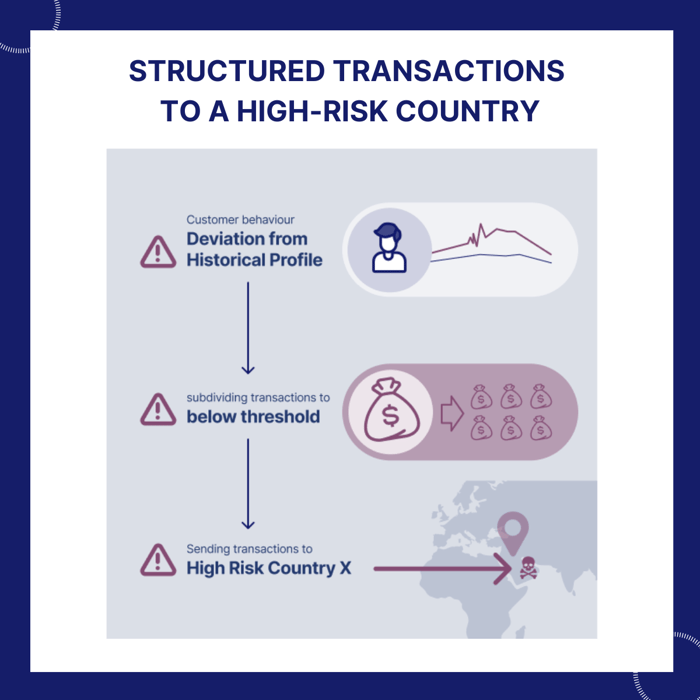How Advanced Detection is Changing Philippines' AML Landscape
In an era marked by rapid technological evolution and growing complexity in financial transactions, Anti-Money Laundering (AML) has become a critical focus for financial institutions worldwide. With the rise of new technologies, innovative detection methods are revolutionizing how AML is approached, particularly in regions like the Philippines. This blog aims to provide an in-depth look at how advanced AML detection is transforming the financial landscape in the Philippines, shaping the future of financial crime prevention in the country.
Advanced AML detection is a game-changer for the financial industry. Traditional AML systems, often rule-based, have been plagued by high rates of false positives and the inability to adapt to emerging trends in money laundering. Advanced AML detection, however, leverages cutting-edge technologies such as artificial intelligence (AI) and machine learning to address these issues, improving the accuracy of detection and the efficiency of AML processes. These advancements reduce the operational burden on financial institutions and enhance their ability to mitigate risks and protect their operations from financial crime.
The Philippine financial landscape is characterized by a rapidly growing fintech sector, increasing digitalization of transactions, and a strong commitment to enhancing financial inclusion. However, these positive trends also bring about challenges in the form of increased susceptibility to financial crimes. AML has therefore become a top priority for the country's financial institutions and regulatory bodies.
The Philippines has made significant strides in strengthening its AML efforts in recent years, but the evolving nature of financial crimes necessitates a continuous enhancement of detection capabilities. Advanced AML detection plays a pivotal role in this regard, providing the tools necessary for financial institutions in the Philippines to stay ahead of the curve in the fight against money laundering. As we delve deeper into this topic, we will explore the impacts of these advancements on the financial landscape of the Philippines and how institutions are leveraging this technology for a safer, more secure financial environment.
AML and the Philippine Financial Landscape
The Role of AML in the Philippine Financial Sector
In the Philippine financial sector, AML plays a vital role in maintaining the integrity and stability of financial institutions. It acts as a crucial safeguard against financial crimes, mitigating the risks associated with money laundering, terrorism financing, and other forms of financial fraud. A strong AML framework is not only a regulatory requirement but also a business necessity, contributing to the overall trust and credibility of the financial ecosystem. As the financial landscape becomes increasingly digitized and complex, the role of AML continues to expand, requiring more sophisticated approaches to detection and prevention.
Existing Challenges in AML Detection in the Philippines
Despite the significant strides made in AML efforts, the Philippines faces several challenges in AML detection. Traditional AML systems often struggle with high false positive rates, leading to increased operational costs and inefficiencies. Moreover, the evolving tactics of money launderers require dynamic and adaptable detection methods, a capability often lacking in rule-based systems.
While beneficial in many respects, the growing digitalization of financial transactions also introduces new vulnerabilities and risks. Cybercrimes, online fraud, and digital money laundering are rising concerns, requiring advanced detection techniques. Furthermore, the Philippines' commitment to financial inclusion means a larger, more diverse pool of transactions, making detection more challenging.
The Impact of AML Detection on Financial Institutions and Businesses
Effective AML detection has far-reaching impacts on financial institutions and businesses. At the most basic level, it helps protect them from the financial and reputational damage associated with being used for money laundering. It also aids in compliance with regulatory requirements, reducing the risk of sanctions and penalties.
Advanced AML detection can also bring about operational efficiencies by reducing the number of false positives and streamlining the process of identifying and investigating suspicious transactions. This can lead to significant cost savings and allow institutions to focus their resources more effectively.
Moreover, businesses that demonstrate robust AML practices can gain a competitive advantage, attracting customers and partners who value security and integrity. As such, the evolution of AML detection capabilities is integral to the future of the Philippine financial landscape, driving compliance and business growth and development.
The Emergence of Advanced AML Detection
Introduction to Advanced AML Detection
Advanced AML detection represents a significant shift from traditional rule-based systems to more sophisticated and dynamic approaches. These methodologies leverage advancements in technology such as artificial intelligence (AI), machine learning (ML), data analytics, and network analysis to detect suspicious activity with greater accuracy and efficiency. Instead of relying solely on predefined rules, advanced AML systems can learn from data, identify patterns, and adapt to evolving risks.
Technological Advancements Contributing to the Evolution of AML Detection
Several technological advancements have contributed to the evolution of AML detection. AI and ML, in particular, have been a game-changer. These technologies enable the analysis of vast amounts of data and the identification of complex patterns that would be difficult, if not impossible, to detect with traditional methods. They can also learn from previous transactions, improving their detection capabilities over time.
Data analytics, another vital tool, allows for aggregating and analysing data from diverse sources, providing a more holistic view of a customer's transactions and behaviours. Network analysis helps identify connections and patterns within and between entities, highlighting potential risks that might otherwise go unnoticed.
Impact of These Advancements on the Philippine Financial Sector
The emergence of advanced AML detection has profoundly impacted the Philippine financial sector. It has introduced new capabilities that address many of the challenges previously associated with AML detection. High false positive rates, a common issue with traditional systems, can be significantly reduced through the use of AI and ML, improving operational efficiency and cost-effectiveness.
These technologies also enhance the detection of new and evolving forms of money laundering, including those associated with digital transactions, thus strengthening the sector's defences against financial crime. Furthermore, advanced AML detection supports the Philippines' financial inclusion goals by enabling the safe and secure expansion of financial services.
By harnessing the power of these advanced technologies, the Philippine financial sector can enhance its AML capabilities, better protect its institutions and customers, and contribute to the integrity and growth of the financial ecosystem.
Tookitaki’s Role in Advancing AML Detection
Overview of Tookitaki’s Transaction Monitoring Solution
Tookitaki is a pioneer in providing advanced AML solutions, including its comprehensive Transaction Monitoring solution. This innovative software leverages artificial intelligence (AI) and a unique industry-wide typology repository to provide robust risk detection and efficient alert management. A notable feature of Tookitaki’s solution is its built-in sandbox environment, which simplifies and accelerates the operationalization and maintenance of the product.
The Transaction Monitoring solution offers 100% risk coverage by accessing the latest typologies through a global AML Subject Matter Expert network. It also includes automated threshold tuning, significantly reducing the manual efforts involved in the process. Furthermore, Tookitaki’s system has a superior pattern-based detection technique, providing a second line of defence for banks to safeguard against new risks and threats.
A typology example is given below:

How Tookitaki's Solution is Contributing to Advanced AML Detection
Tookitaki’s Transaction Monitoring solution is contributing significantly to the evolution of AML detection in the Philippines. Its cutting-edge technology ingests new and updated typologies for scenario testing in simulation mode, which automatically generates risk indicators and their respective thresholds. The system also offers automated UI-driven scenario testing, allowing multiple tests to be run in parallel.
Tookitaki’s solution eliminates the need for manual threshold tuning by automatically generating threshold values for rules. It has a powerful risk-based detection engine that supports complex network relationships, detecting suspicious transactions using a combination of rules and machine learning.
Specific Benefits of Tookitaki’s Solution in the Philippine Financial Landscape
In the context of the Philippine financial landscape, Tookitaki's solution provides a number of key benefits. It helps local financial institutions modernize their compliance processes, making them more efficient and effective. The advanced detection capabilities significantly reduce false positives and streamline alert investigation, freeing up resources for other critical tasks.
Tookitaki's solution adapts to changes in the data sets over time, learning from data distribution shifts, rule/threshold changes, and new typologies. This ability to self-learn and adapt to evolving patterns of financial crime is a critical asset for the dynamic and fast-growing Philippine financial market.
In summary, Tookitaki’s Transaction Monitoring solution is making a significant contribution to the advancement of AML detection in the Philippines. Its sophisticated, AI-driven capabilities are improving the efficiency and effectiveness of AML processes and enhancing the overall integrity of the Philippine financial sector.
The Future of AML Detection in the Philippines
Emerging Trends in AML Detection
The future of AML detection is set to be influenced by several emerging trends, primarily driven by technological advancements. These include the growing use of artificial intelligence (AI) and machine learning (ML) in risk detection and alert management. This trend is already being witnessed through solutions like Tookitaki's Transaction Monitoring, which utilizes these technologies to enhance the effectiveness of AML processes.
Another key trend is the integration of big data analytics into AML frameworks. As the volume of financial transactions continues to grow exponentially, leveraging big data tools can help financial institutions sift through massive amounts of data and identify suspicious activities more accurately and quickly.
Potential Benefits of These Trends for the Philippine Financial Sector
These emerging trends promise significant benefits for the Philippine financial sector. The use of AI, ML, and big data analytics can result in more accurate detection of suspicious activities, reducing false positives and improving the efficiency of AML processes. This can lead to significant cost savings for financial institutions.
The adoption of blockchain technology could enhance the transparency of financial transactions, making it harder for money launderers to operate. This could help improve the reputation of the Philippine financial sector, encouraging more foreign investment and contributing to economic growth.
Role of Regulatory Bodies and Financial Institutions in Adopting These Trends
Regulatory bodies and financial institutions will play a crucial role in harnessing these emerging trends. Regulators need to provide clear guidelines on the use of these technologies in AML processes, addressing issues related to data privacy and ethical AI use.
On the other hand, financial institutions will need to invest in these technologies and upskill their workforce to effectively use these advanced tools. Institutions like Tookitaki can play a vital role in this transition by providing innovative and user-friendly solutions that can be easily integrated into existing AML frameworks.
In conclusion, the future of AML detection in the Philippines looks promising, with numerous technological advancements set to revolutionize the way financial institutions detect and prevent money laundering. The Philippine financial sector can significantly enhance its AML capabilities by embracing these trends, contributing to a more secure and robust financial ecosystem.
Navigating the New Landscape: AML Detection in the Digital Age
The advancements in AML detection have undoubtedly ushered in a new era for the Philippine financial sector. The integration of AI and ML, big data analytics, and blockchain technology into AML frameworks has not only enhanced the effectiveness and efficiency of AML processes. Still, it has also significantly transformed the financial landscape.
The significance of continued technological innovation in AML detection cannot be overstated. As financial crimes become more sophisticated, so must our detection and prevention methods. The ability to quickly adapt to emerging trends and harness the power of new technologies will determine the success of financial institutions in combating money laundering.
Looking ahead, the future of the financial landscape in the Philippines in the context of AML detection appears bright. With the robust adoption of advanced AML solutions, financial institutions can expect to see enhanced risk detection, improved operational efficiency, and a reduction in the occurrence of financial crimes. This, in turn, will contribute to a more secure, transparent, and trusted financial ecosystem in the Philippines.
The journey to advanced AML detection begins with a single step. We encourage Philippine financial institutions to take that step today by booking a demo for Tookitaki’s Transaction Monitoring solution. Experience firsthand how our solution leverages the power of AI, ML, and big data to provide comprehensive risk detection and efficient alert management. Let's work together to create a safer, more secure financial sector in the Philippines.
Anti-Financial Crime Compliance with Tookitaki?




